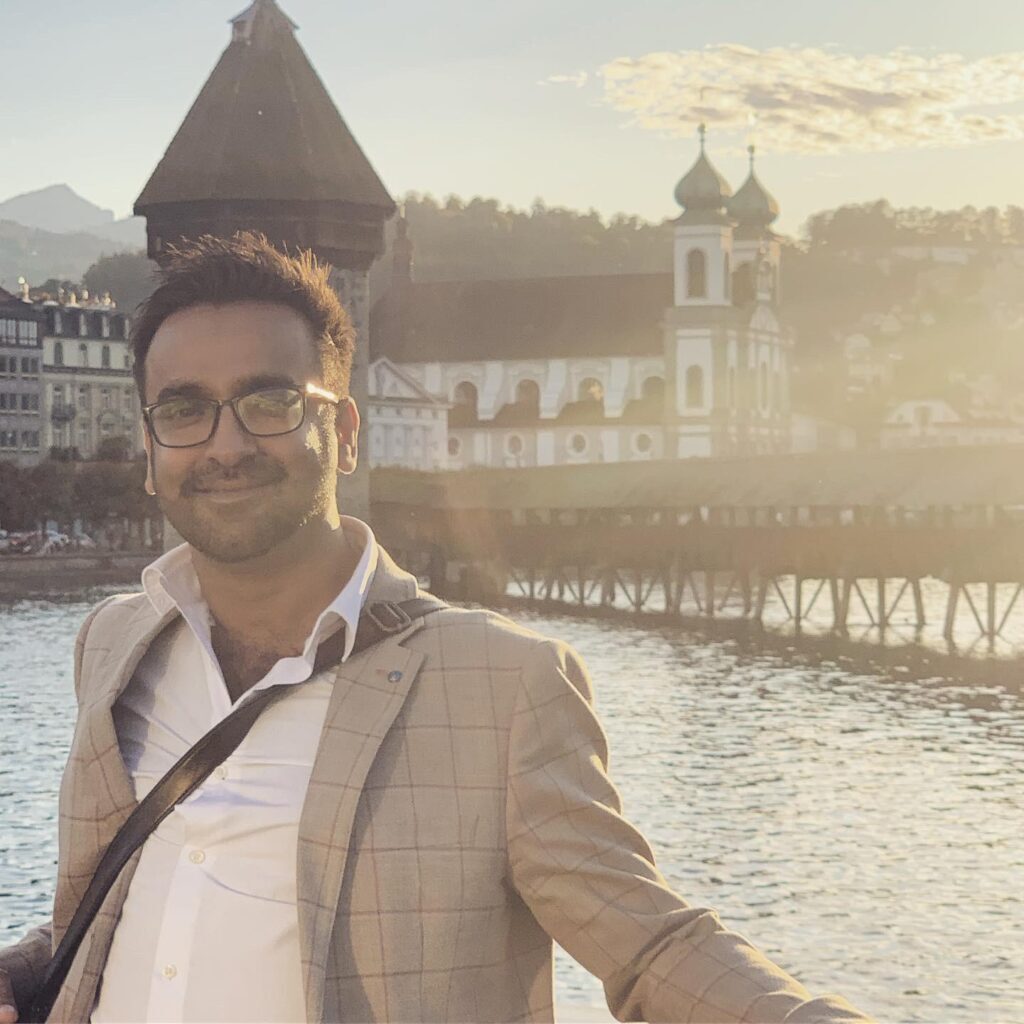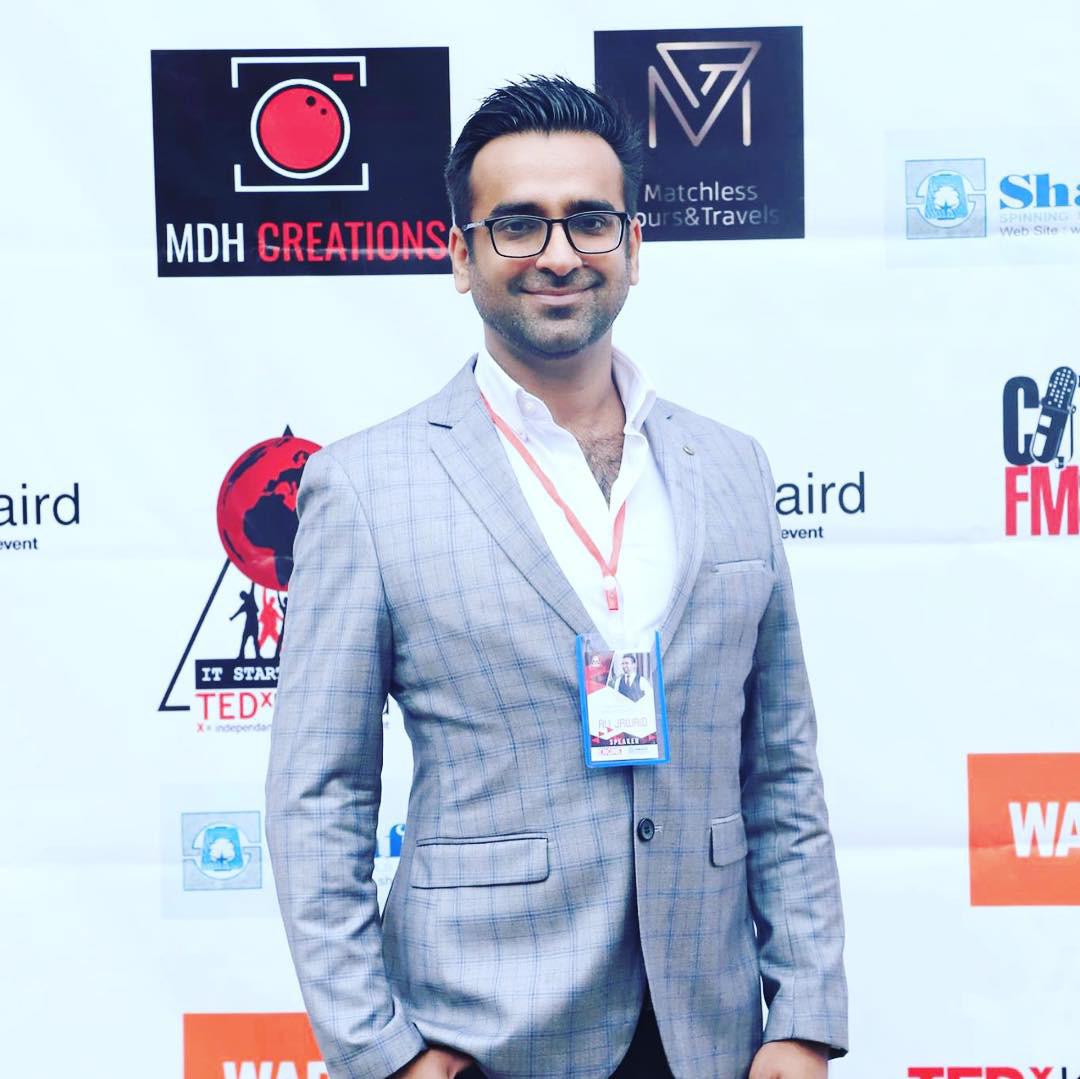Dr. Ali Jawaid, a Swiss-Pakistani Neuro-scientist, is one of the many overseas Pakistanis taking the world by storm. His recent research work explains how early life trauma affects development not only in the immediately affected individuals but can also be passed on through generations. Dr. Ali Jawaid, as a child, survived peripheral autoimmune nephropathy by being treated with an experimental drug, which is now the standard of treatment for that disease. Being fascinated by this, he began exploring how the brain and nerves work at a very early age.
Below are some excerpts of his recent conversation with our EIC, Saadeqa khan.
Tell us about your childhood?
I was born the youngest in a family where education and respect were highly emphasized. My father had 3 master degrees, and all my siblings took prestigious career paths; from arts to literature to surgery to engineering to business management. As my father worked in civil service, he had a lot of transfers and relocations both within and outside Pakistan. Growing up like that makes you quite adaptable but also you end up losing friends a bit too frequently. Like every other kid, I played cricket- in all forms, on the street, on the ground, on the computer, and even the ‘copy cricket’ version, which all the 90s kids would know about. I also wrote for a children’s magazine and was this cheerful over-confident kid who loved talking more with adults than other children his age.
What motivated you to pursue an offbeat career as a Neuroscientist?
I survived a neurological illness as a child and in fact, was given an experimental treatment at that time. Somehow, this was very fascinating for me and I used to ask a lot of questions to doctors and nurses about the brain and nerves. This was practically my introduction to Neuroscience at the age of 10. The pursuit of Neuroscience leads me to choose medical studies. After my graduation from Aga Khan University, I went for clinical and research work in Neurology to the US. Seeing a lack of effective treatments for most neuropsychiatric disorders, even in a country like the US, was the biggest motivation for me to get more and more involved in mechanistic neuroscience research, so that the risk and inheritance of these diseases could be studied. I think, in the end, it was the combination of curiosity and compassion that lead me to this career.
Tell us about your recent research work?
I am currently involved in a huge multi-centric study where we check how losing parents early in life affect the brain and body of children, which of such negative effects persist till adulthood, and what kind of damage can they do to the germ cells so that the effects will be even transmitted to the next generation. At the same time, we are trying to identify if any factors, for example, foster care or certain supplements like cod liver oil can lessen the harmful effects of trauma in children or their transmission. Besides this project, I am involved in studies on patients with dementia where we are trying to target some toxic proteins which cause the neurons to die with dementia illnesses. I am also leading research efforts to improve the cognitive deficits that people with dementia encounter.

What is epigenetic Trauma?
Epigenetic trauma is a concept that the effects of traumatic experiences leave biological traces on germ cells and thus have effects that can be inherited. Notable examples are how children and even grandchildren of holocaust survivors have increased depression, anxiety, and behavioral problems. We are studying it now at the molecular level to find out how are the effects of trauma communicated to the germ-line.
How does Trauma affect a child’s development?
Unfortunately, the effects of early life trauma can be quite negative. Our work, as well as, of others has shown that trauma in early life can lead to neurological, psychological, and metabolic disturbances that persist into adulthood. However, strong support, and enriching environment, and certain supplements could mitigate the long-term negative sequelae of trauma. It is important that such interventions are started early.
Tell me a situation where are you being a Neuroscientist has clearly benefited your daily life?
I think in many ways. The biggest application of neuroscience for me has been in teaching, where I focus on my neuroscience knowledge to enhance learning in students. This means adding a context to teaching, with conceptual reinforcement and relying more on critical thinking than just memory.
Mental health is still considered a taboo subject in Pakistan. What do you think is the best way to make aware of our layman about mental health importance?
You are absolutely right. We live in a culture where dementia is considered a normal part of aging, where depression is hidden, where anxiety is considered a weakness of character. In colleges and universities, we see students using pills and recreational drugs because they do not have proper mental health support. I strongly believe that mental health should be taught as an integral subject, and parents and teachers should be given guidance about healthy interaction styles and how to help young people cope with struggles.
The other important change is that prominent people in the media need to increase mental health awareness. Famous actor, Usman Mukhtar, who also happens to be a good friend of mine, is doing a remarkable service in this regard. I strongly believe that others should follow. For example, Momina Mustehsan, who herself is a biomedical engineer could be an ideal person to take the lead in talking about mental health and neuroscience in the country.
What can the general public do to decrease the risk of dementia?
It is a very important question. There are different types of dementia. Some types of dementia are due to high cholesterol levels and damage to blood vessels. For this kind of dementia, a healthy lifestyle and diet-control have a very important role. Some other types of dementia, such as Alzheimer’s disease, are related to brain injury, stressful lifestyle. However, some factors are common to all dementia types. Half an hour exercise per day, increasing anti-oxidant foods such as blueberries, dark chocolate, beetroots, beans, supplementation of omega-3 fatty acids, staying stress-free, keeping your brain busy during old age, all can have a protective effect. A very good board game to keep the brain busy in old age is chess, snakes, and ladders.
What do you believe is your best asset?
I think my biggest asset is that I was raised with strong values about honesty and integrity. That has served me the most in my professional ethics. I would not call the other things as assets but rather skills I acquired or learned, for example, analytical skills and strong communication. I am, by no means, a gifted savant. I have had struggles during my career as well but I just kept on being perseverant.
Epigenetics is an emerging field of science, but people here in Pakistan are not aware of it in depth. Do you have some plans for making aware of our layman about the importance of epigenetics?
That is a very interesting question. One hand, indeed, there is a lack of knowledge about scientific disciplines, such as epigenetics. However, on the other, epigenetics is, in fact, just the interaction of the environment with the genes and people in Pakistan believe a lot in the importance of environmental influences, such as diet on health. So, we need to speak the language, which people can understand. Start with the prevalent beliefs and then add simple scientific reasoning. I think main-stream media can play a huge role in this. It is very unfortunate that there is not even a single program promoting science in Pakistan, not even a YouTube channel.
What are your plans for the youth who are willing to pursue a career as a scientist?
I have always tried to focus on the rich scientific potential of Pakistan and want the youth to explore this ‘gold-mine of research’. We have a population, which is genetically very similar (due to cousin marriages) and yet have ethnic diversities, we have Macedonian-origin people living in Kalash where average life span is 15 years longer than in Pakistan or Macedonia, we have herbs with potential therapeutic properties in dementia, we have Hafiz-e-Quran children who have memory sharp enough to remember hundreds of thousands of words.
These are just one of the many research avenues that can be explored in Pakistan. I wish that one day our universities start conducting research centralized on these topics and provide students the opportunities to present this work around the globe. Last year July 26th was one the most satisfying days of my life, when Science, one of the world’s best scientific journals, published a feature about my work with the SOS children’s village in Pakistan.
Do you envision serving Pakistan in a larger capacity?
I definitely would be willing to help in research capacity-building and curricular development in the field of science and technology. The future of this world is in science, and we need to start investing in it now. Irrespective of any political affiliation, if any government asks me to work in an advisory capacity, I will be more than willing.
Also read: Promoting psychological well-being, an enlightening note from Zuafishan Qureshi

Saadeqa Khan is the founder, CEO, & Editor-in-Chief of Scientia Pakistan. She’s a member of the Oxford Climate Journalism Network (Second Cohort) and NASW. Saadeqa is a fellow of NPF Washington, The Falling Walls Foundation, and the Science Journalism Forum. Saadeqa has won several international journalism grants and awards for her reports.

